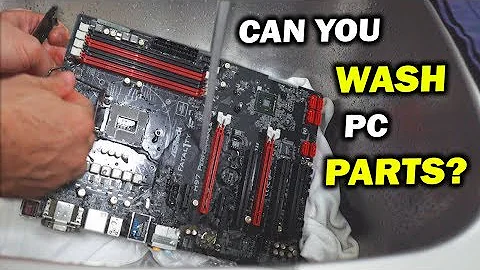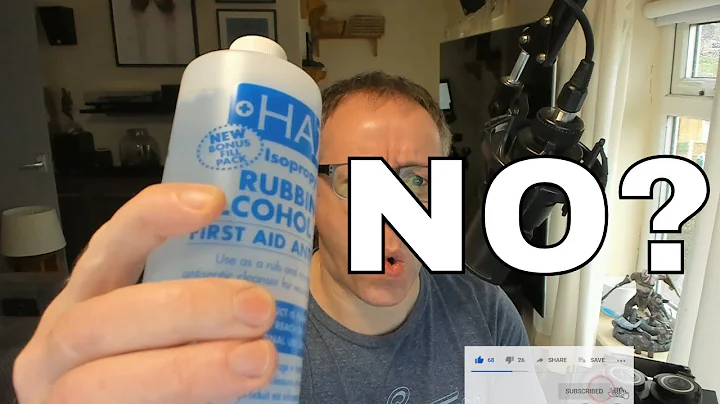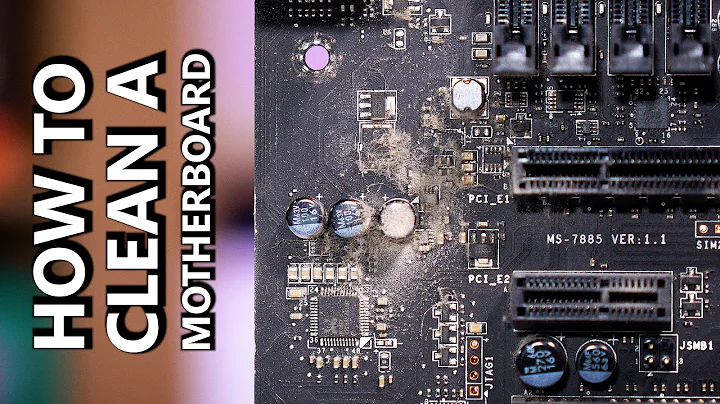Is it safe to soak a motherboard in vinegar?
Solution 1
EDIT I missed the battery part and thought you talked about leaking capacitors. As the cleaning issue is exactly the same I'll let my answer stand as is.
This isn't safe and wouldn't repair the motherboard anyway.
Vinegar is mainly (80%-95% depending on strength) water with a lot of impurities and 50-20% light acid.
Electronics, acid and water don't mix. Pure water without minerals/chlorine and other impurities by itself isn't harmful. But vinegar is far from pure.
It would clean of the residue alright, but it would leave various chemicals from the vinegar on the motherboard, that (together with the acid and water) would deteriorate the various metal components (like soldering joints and PCB wiring).
Rinsing of thoroughly with a lot (think 5-10 liters) of de-mineralized water would flush that away, but the damage could already been done, especially if you leave it to soak long (more than 10 minutes or so).
Anyway it wouldn't repair the damaged capacitors. These need to be replaced with new ones. If only a few of the less important capacitors heave leaked the Amiga might still be in working condition. The Amiga is fairly over-engineered and quite forgiving to this kind of abuse.
I have been in the same position with an Amiga 2000 and a 500.
I cleaned of the residue with iso-propyl alcohol (applied with a soft cloth) which is safe to use on a computers insides. Just let it evaporate after cleaning. Do NOT rinse with water!
I had to solder 3 new caps in the A200. The A500 ran fine without further repairs.
Solution 2
I believe it's safe but not for 'hours' - it should be minutes. For some wide spread, but light corrosion from battery issues - I get a tub and fill with distilled white vinegar (Target or most stores will have gallon sizes of this) and let a board soak for about 2 min. Then very gentle brushing (with an old toothbrush) without applying force will do two things-
- the acid will remove the battery corriosion (green)
- the acid will give the board a gentle cleaning removing any dirt or other contaminates
You must then remove the board, blow it dry (compressed air is best - get a small compressor for nail guns from a hardware store). Then wash out the brush and tub with water and dry.
Then do another rinse with 99% isopropyl to remove any vinegar (acid) residue on the boards. Dry again with compressed air.
If there are board sockets ensure you are getting them cleaned and dried.
I don't normally remove any socketed chips if they don't look damaged (at this point- you may have to later on).
You may do the baking in the oven at 200 (turn off oven and let sit) but I don't do that. If the air is dry (winter- about 10-15% humidity) it will dry in an hour.
This acid wash will remove the surface issues and allow you to now examine what if any other damage you need to address with more detailed trace repair work.
Related videos on Youtube
chue x
Updated on September 18, 2022Comments
-
 chue x over 1 year
chue x over 1 yearSome older motherboards have batteries that will leak over time. Obviously this can cause damage to the motherboard. I read on the interwebs that to clean up the leakage, one could:
- take the motherboard and soak it in a tub of vinegar for a few hours.
- rinse the motherboard with water.
- let dry prior to powering up.
My question is: Is doing the above safe for the motherboard?
A little more info:
- I may not be able to just go out and buy another motherboard, since this would be for a vintage computer, e.g. an Amiga
- I don't actually have an old motherboard to do this with, I am just curious if it is safe.
-
 Ƭᴇcʜιᴇ007 about 7 yearsPlease better define "Safe".
Ƭᴇcʜιᴇ007 about 7 yearsPlease better define "Safe". -
 chue x about 7 yearsBy "safe", I am asking if doing the above will cause damage to the motherboard.
chue x about 7 yearsBy "safe", I am asking if doing the above will cause damage to the motherboard.
-
Ramhound about 7 yearsI agree with this answer, although the question was about batteries, the answer still applies. Any damage done by the battery leaking has already been done, and that damage would have to be identified and fixed, in order for the motherboard to be functional. It is best to use isopropyl alcohol, or if you are really desperate I suppose deionized water, would also work. However, If you have any doubts about your skill, you should find somebody who feels more confortable clean and repair the damage itself.
-
Tonny about 7 years@ramhound Somehow I got leaking caps and leaking batteries confused. Probably because I have seen a lot of the first. But it doesn't really matter for the answer. Same would apply to removing cooling paste spilling or the residue left by a glass of soda (cola yikes) going into the computer.
-
Ramhound about 7 yearsabsolutely, although the cola spill would be more serious.
-
Tonny about 7 years@Ramhound The main thing about cola is the acidity combined with the high sugar content. Double whammy. The sooner you clean it the better. If it has the chance to sit and fester for 30 minutes... The electronics are a write-off. Best thing is to poor out the cola immediately and flush with water liberally (even just tap-water). Then rush to the nearest pharmacy to get some bottles of de-ionized water and iso-propyl. Rinse with a lot de-ionized water first, dry of with a cloth and then use the iso-propyl. I have rescued a couple of smartphones and mp3-players that way. Success-rate about 60%
-
 chue x about 7 yearsThank you for confirming my suspicion. It does seem weird to me to submerge a motherboard in any liquid.
chue x about 7 yearsThank you for confirming my suspicion. It does seem weird to me to submerge a motherboard in any liquid. -
Tonny about 7 years@chuex It gives me the creeps too :-) It just doesn't seem right. But as long as the fluid is chemically not interacting with the motherboard and doesn't conduct electricity it is perfectly safe. Oil cooled motherboards are a thing. And liquid nitrogen (popular with over-clockers) is a fluid too!
-
Andy D over 3 yearsFor some instances of widespread corroison a tub and vinegar is a very good solution. It's basically a light acid bath. You must then do another rinse/tub with something to remove the vinegar residue. Like 99% isoproply.
-
Andy D about 3 yearsModern batteries are alkaline based- therefore the acid in the vinegar will neutralize the muck. Be sure not to leave it in too long, eventually the acid can eat away at your circuit traces.




